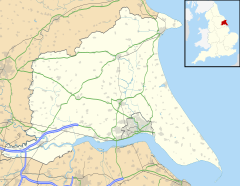Eastrington
| Eastrington | |
|---|---|
| Eastrington shown within the East Riding of Yorkshire | |
| Population | 1,147 (2011 census) |
| OS grid reference | SE796299 |
| Civil parish |
|
| Unitary authority | |
| Ceremonial county | |
| Region | |
| Country | England |
| Sovereign state | United Kingdom |
| Post town | GOOLE |
| Postcode district | DN14 |
| Dialling code | 01430 |
| Police | Humberside |
| Fire | Humberside |
| Ambulance | Yorkshire |
| EU Parliament | Yorkshire and the Humber |
| UK Parliament | |
Eastrington is a small village and civil parish in the East Riding of Yorkshire, England. It is situated approximately 3 miles (5 km) to the east of Howden.
The civil parish is formed by the village of Eastrington and the hamlets of Newland, Owsthorpe and Portington. According to the 2011 UK Census, Eastrington parish had a population of 1,147, an increase on the 2001 UK Census figure of 880. Eastrington lies within the Parliamentary constituency of Haltemprice and Howden an area that mainly consists of middle class suburbs, towns and villages. The area is affluent and has one of the highest proportions of owner-occupiers in the country.
The village is served by Eastrington railway station (formerly "South Eastrington") on the Hull to Selby railway line, and was historically also served by North Eastrington railway station on the Hull and Barnsley Railway.
Nearby Eastrington Ponds was designated a Local Nature Reserve in 2002 by the East Riding of Yorkshire Council. The village is served by a local shop and the Black Swan public house.
In 1823 Eastrington was in the Wapentake and liberty of Howdenshire. At the time the King was the patron of Easington's Church of St Michael. A Methodist chapel and a free school existed. The village had a population of 375, with occupations including six carpenters, four farmers, two shopkeepers, a shoemaker, a blacksmith, a corn miller, a tailor, and the landlord of the Bay Horse public house. Also directory-listed was a school master and a yeoman.
...
Wikipedia

